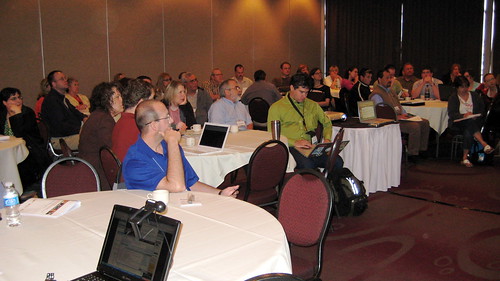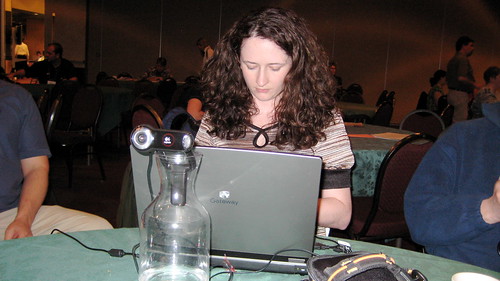
Imagine a classroom, where at any point in time, the students can interact with one another about the material being presented (or where they can engage in discussion on more important topics!). A place where 'speaking during the lesson' is not only allowed, but encouraged... This is the essence of the Ustream.tv classroom for remote participants at TLt Summit 2008 currently taking place in Saskatoon, Saskatchewan.
 Although I've been a virtual attendee at a handful of distant conference experiences this year, the TLt event has been at least as memorable as Educon 2.0. In parachuting in, I'm coming to value the back-channel discussions at least as much as the presentations. Even though the parallel discussions are disorganized and random, it is easy to see how a conference could take advantage of this technology, engaging both on site participants, and remote educators.
Although I've been a virtual attendee at a handful of distant conference experiences this year, the TLt event has been at least as memorable as Educon 2.0. In parachuting in, I'm coming to value the back-channel discussions at least as much as the presentations. Even though the parallel discussions are disorganized and random, it is easy to see how a conference could take advantage of this technology, engaging both on site participants, and remote educators.  Part of the attraction for me is that this event has attracted the attention of many from the Twittersphere, including a number of well-known Canadian edu-bloggers, and I find myself wondering what might happen if facilitators or co-hosts were to become more actively involved in prodding online participants to consider key questions/issues.
Part of the attraction for me is that this event has attracted the attention of many from the Twittersphere, including a number of well-known Canadian edu-bloggers, and I find myself wondering what might happen if facilitators or co-hosts were to become more actively involved in prodding online participants to consider key questions/issues.Earlier this year, I shared the story on SlideCasting 2.0 that has the potential to extend discussions and deep thinking beyond the timeframes of a given lecture; This week I've learned that even 'off-topic' discussions can be very enriching for participants!
Sample Back-Channel Chat from Stephen Downes presentation.
The Teacher 2.0 Podcast episode on this topic is now available.
Photo Credits: "Jen sets up the UStream" and "Audience" by Dean Shareski




4 comments:
Over the past year, I've been taking every opportunity I can to engage in backchannelling activities. The first time I saw backchannelling in action was last year at NECC in Atlanta. I was able to see it working while I was physically there, as well as after I returned home (I couldn't stay for the whole conference). While I could immediately see the potential for both professional and classroom learning, I initially felt that I didn't have the required skill set to be an active participant. My brain seems to be wired in a more-or-less linear fashion and initially it seemed overwhelming to keep up with the pace and as you say "random" nature of the conversations. I'm happy to report that you can teach an old dog new tricks and I'm feeling pretty comfortable these days in backchannel conversations! I'm off to watch a TLt UStream presentation now, courtesy of Alec Couros. See you in the "backchannel"!
I'll be looking for you Diane!
As a new learner of technology in the classroom and an educator as well, I can also see backchannelling as a valuable tool in the classroom. Especially, as you mentioned, to extend the discussion and to propel the discussion forward. As educators at a technology conference, you (and other educators trying to use the technology to forward education) are motivated to learn and use the technology to FORWARD your learning of the topic. However, what about those students in a classroom who are used to multi-tasking and can carry on conversations through backchannelling that are NOT related to the topic but perhaps to find out what the social plans are for Saturday night, or who is going out with whom, and so on…and so on….How do educators, who are comfortable with not being in charge in front of the classroom and welcome multiple perspectives and conversations, monitor the backchannelling topics? Is it even necessary? I’ve found that sometimes my backchannelling is more social rather than engaging in higher order thinking…what’s wrong with that?!? Anything?!? But how do we “sell” that to administrators who are looking for higher standardized test scores?
Traci,
I find it interesting that conference attendees feel justified in finding engaging content, even if it means dropping into unscheduled workshops or participating in off-topic conversations. This type of behaviour is generally not tolerated with our own students.
When it comes to test scores, I guess I'm left wondering why we think all learning has to be measured... or even why we believe that such an abstract concept even can be measured!
Post a Comment